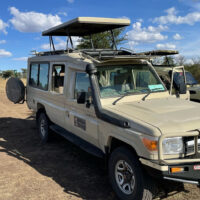Shots, Vaccinations,
and Medications
for Tanzania
10.07.2016

Hello, Travelers! This will be the first in a short series of informational messages to help you prepare as you draw closer to your date of departure.
Other topics include:
- Passports & Visas
- Personal Hygiene
- Currency & Tipping
- Gear Lists, Packing and Baggage Weight Restrictions
This post is all about the fascinating subject of Shots and Vaccinations.
If you haven’t been to East Africa in, say, the last decade, it is possible your vaccinations may need a little upgrading.
Depending on how long you may stay and what you may be doing there, the Center For Disease Control (CDC) currently thinks travelers going to Tanzania may need the following vaccinations, depending on their activities while there:
- Hepatitis A
- Hepatitis B
- Typhoid
- Rabies
I think it is also a good idea to have the following vaccinations up-to-date:
- Polio/diphtheria booster
- Measles/Mumps/Rubella (MMR)
- Tetanus
- Flu
The CDC also informs us that Malaria is a risk while visiting Tanzania and Zanzibar:
Talk to your doctor about how to prevent malaria while traveling. You may need to take prescription medicine before, during, and after your trip to prevent malaria, especially if you are visiting low-altitude areas.
See more detailed information about malaria in Tanzania.
Regarding the risk of encountering the Zika virus while in Tanzania, the CDC says this:
Zika is endemic in Tanzania, and we believe the risk to travelers is low. Because of the risk of birth defects in babies born to women who were infected with Zika while pregnant, women who are pregnant or planning to become pregnant should discuss their travel plans with their doctor and, if they decide to travel to Tanzania, strictly follow steps to prevent mosquito bites.
For more information, see Q&A: Zika Risk in Countries with Previous Zika.
Last, Tanzania does not require a Yellow Fever card for entry unless you are entering from a country that does require it (the U.S. does not require it). If that applies to you, check out the link on their website.
Of these vaccinations, most can be administered at the same time, fairly close to the time of departure. Only one, Hepatitis A, requires a series of two injections for full protection, about six months apart. Start by checking with your doctor on what vaccinations you may need based on your itinerary and planned activity (hiking in primarily rural areas).
It is possible that your health insurer will cover much of the cost of these vaccinations, and may offer a Travel Advice Clinic or hotline to provide advice. If not, try any of the major retail pharmacy chains, many of which offer sound medical advice to customers anticipating travel, at a moderate cost.
I think it is a good idea to always travel with your vaccination record, just in case a doctor somewhere needs to know what vaccinations you’ve had. Keep a photocopy of it in your passport folder, along with First Aid certifications, American Red Cross blood- type card, and any other special medical advisories you would want a care provider to know about in the event of illness or injury.
Other medications that I find useful to have with me, and which your doctor will cheerfully prescribe for you if you explain why you want them, include:
- For Upper respiratory infections: Azithromycin (5-day doses called Z-Paks)
- For Travelers Diarrhea: Imodium or Pepto-Bismol tablets (surprisingly, these are sometimes difficult to find in the pharmacies of developing nations)
- For Altitude related symptoms: Diamox (Acetazolamide 250mg)
- For a happy gut: Probiotics
- For mild pain: Aspirin/Tylenol/Ibuprofin/Aleve
- For hydration: Powdered Electrolytes
- For a clean and wide-open nose: Saline solution
- For small cuts or blisters: Neosporin
- For, well, you know what this is for: Gas-ex
Other useful supplies may include:
- Blister kit (bandages/moleskin/duct tape or surgical tape/scissors)
- Small 1st Aid kit
- Sunscreen
- Lip balm
- Ear plugs
- Hard candies (Jolly Rancher, Root Beer Barrels, Ricola)
You probably will not need all these items, and many of them can be purchased locally if needed. There may be other medications you will want to have with you, depending on your personal medical needs.
And finally:
You should always consult with your own doctor about the efficacy or suitability of any medication before taking it.
Visit Embark’s insurance partner: Trip Assure Insurance



